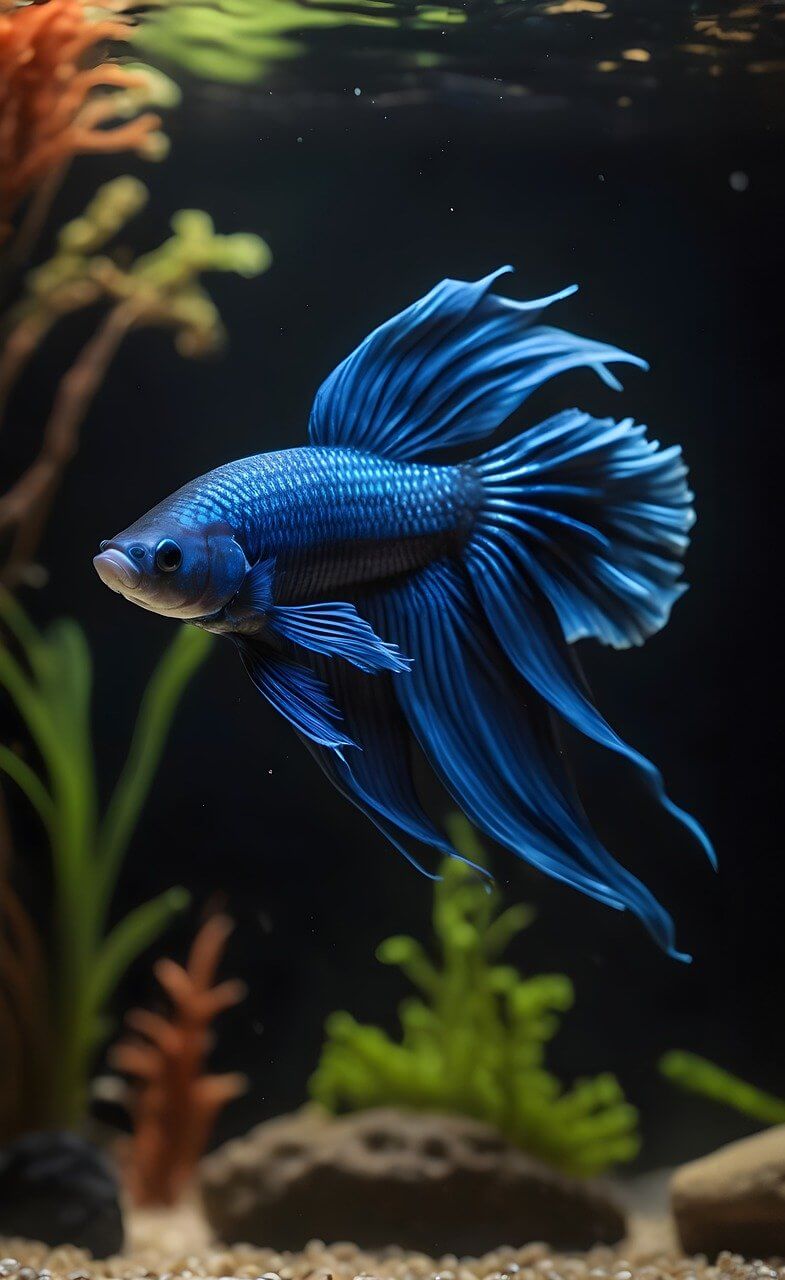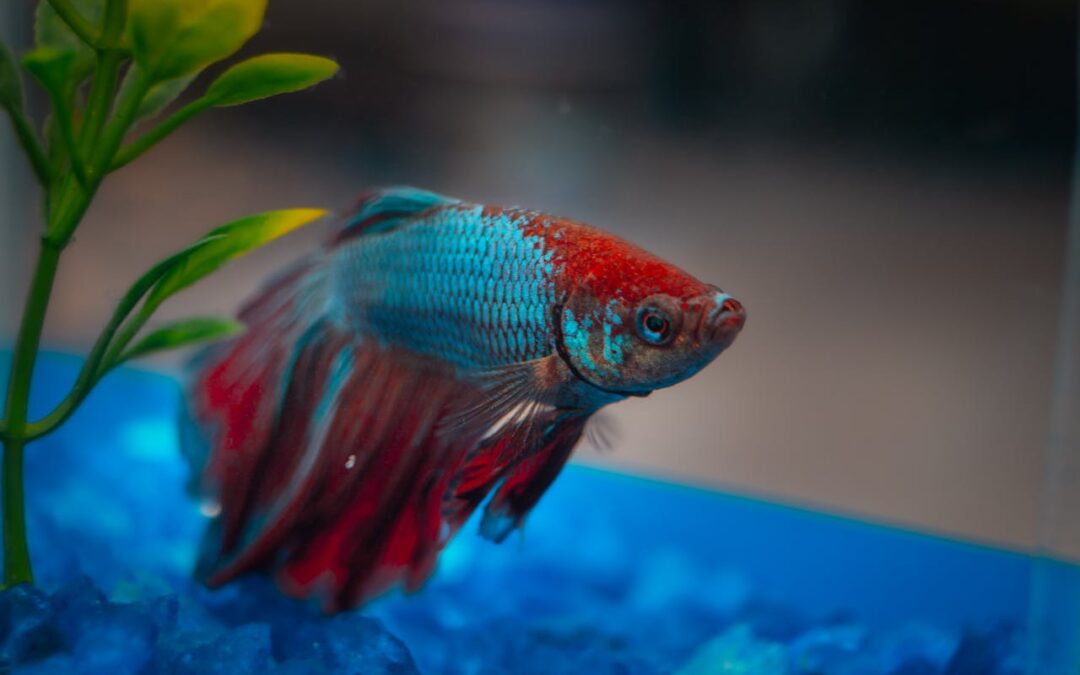If you’ve ever owned a betta fish, you’ve likely marveled at their vibrant colors, flowing fins, and active personalities. But have you ever wondered if your betta fish sleeps? Observing them at night or during moments of stillness may lead you to question whether they’re sleeping or just resting. In this post, we’ll delve into the fascinating world of betta fish behavior, focusing on their sleep patterns, how to recognize when they’re sleeping, and what you can do to ensure your betta gets adequate rest.
Understanding Sleep in Betta Fish
Yes, betta fish sleep! Like all animals, they require rest to recharge and maintain their health. However, their sleep habits differ significantly from those of mammals, making it a little tricky to spot. Unlike humans, who experience deep sleep characterized by a lack of awareness of their surroundings, bettas rest in a state of reduced activity and alertness.
Betta fish are diurnal, which means they are most active during the day and sleep primarily at night. This pattern mimics the natural light cycles of their native habitat in Southeast Asia, where days are bright and nights are dark. However, bettas can also nap briefly during the day.
How Do Betta Fish Sleep?
Betta fish don’t have eyelids, so they can’t close their eyes while sleeping. This might make it hard to tell when they’re asleep, as they appear awake even during rest. Instead, their bodies and behavior give subtle signs of sleep:
- Stillness: A sleeping betta will often remain completely still, either floating near the surface, resting on a plant, or lying on the substrate at the bottom of the tank.
- Faded Colors: During sleep, their vibrant colors may appear slightly duller, a natural response to a lower metabolic state.
- Unresponsiveness: While they’re resting, bettas won’t react as quickly to external stimuli, such as movement outside the tank or light changes.
Where Do Betta Fish Sleep?
Betta fish have unique sleeping habits, and their choice of resting spot can vary. Here are some common places where bettas like to sleep:
- On Plants: Bettas often rest on broad leaves, using them as a hammock.
- Near the Surface: Since bettas are labyrinth fish and can breathe air directly, they may prefer sleeping close to the water’s surface.
- In Caves or Decorations: Bettas enjoy hiding in small spaces, so tank decorations like caves, logs, or hollow ornaments are popular sleep spots.
- On the Substrate: Some bettas settle at the bottom of the tank to sleep, lying flat or slightly tilted.
How Long Do Betta Fish Sleep?
Betta fish sleep for several hours a night, similar to the duration of night-time darkness. They may also take short naps during the day. If your betta appears to be sleeping too much or not enough, it could indicate stress, poor tank conditions, or illness.
Do Betta Fish Need Darkness to Sleep?
Yes, darkness is crucial for betta fish to establish a natural sleep cycle. In the wild, bettas experience regular light and dark periods. In captivity, replicating this cycle is vital for their well-being.
Here are some tips for maintaining a healthy light-dark schedule:
- Set a Lighting Routine: Use a timer to provide 8–12 hours of light followed by 12–16 hours of darkness.
- Avoid Constant Brightness: Too much light can stress your betta and disrupt their natural sleep cycle.
- Provide a Quiet Environment: Ensure the tank is placed in a low-traffic area to minimize disturbances during rest.
Signs Your Betta Fish Is Sleeping
To determine if your betta is asleep, observe the following signs:
- Stillness: They remain motionless but might occasionally flick a fin to maintain balance.
- Resting on Objects: Bettas often perch on plants or decorations while sleeping.
- Subtle Color Changes: Their colors may fade slightly during deep rest.
- Unresponsive Behavior: They might not respond immediately to stimuli like tapping on the glass (note: avoid tapping frequently as it can cause stress).

How to Create an Ideal Sleeping Environment for Betta Fish
A healthy sleep routine starts with a properly set-up tank. Here are some ways to ensure your betta gets enough rest:
1. Lighting
Maintain a consistent lighting schedule. Use an aquarium light with a timer to simulate natural day and night cycles. Avoid sudden light changes, as they can startle your fish.
2. Tank Decorations
Provide plenty of hiding spots, such as plants, caves, or driftwood. These give your betta a sense of security and comfortable places to sleep.
3. Comfortable Temperature
Keep the water temperature between 76°F and 81°F (24°C to 27°C). Sudden temperature changes can stress your betta and disrupt their sleep.
4. Minimal Noise
Place the tank in a quiet area to prevent disturbances. Loud noises or vibrations can interfere with their rest.
5. Avoid Overcrowding
A solitary betta feels less stressed and sleeps better. Avoid keeping them in community tanks unless the other inhabitants are peaceful and non-threatening.
Common Misconceptions About Betta Sleep
Despite their popularity, there are several myths about betta fish sleep. Let’s debunk a few:
- “If they’re not moving, they must be sick.”
Not always! Bettas often stay still while sleeping. However, prolonged inactivity or other symptoms like clamped fins or refusal to eat might indicate illness. - “Betta fish don’t need darkness; they can adapt to light.”
While bettas can adapt to various conditions, constant light can lead to stress, disrupting their natural sleep cycle and overall health. - “Bettas don’t need rest because they’re small.”
Even small animals like bettas need adequate rest to maintain their physical and mental health.
When to Worry About Your Betta’s Sleep
While it’s normal for bettas to sleep at night or nap during the day, certain behaviors might indicate an issue. Keep an eye out for these signs:
- Sleeping Too Much: If your betta is inactive for extended periods, check for signs of illness, such as faded colors, labored breathing, or loss of appetite.
- Erratic Sleep Patterns: Constantly darting or hiding may signal stress or poor water quality.
- Difficulty Breathing: If your betta struggles to reach the surface or seems lethargic, there may be an oxygen or health issue.
If you notice any of these issues, assess the tank conditions (water quality, temperature, etc.) and consult a veterinarian specializing in fish.
Conclusion
Betta fish do sleep, and understanding their sleep habits is essential for keeping them healthy and happy. Observing their unique resting behaviors—whether they’re nestled on a plant, hidden in a cave, or floating near the surface—offers insight into their well-being. By providing a tank environment that mimics their natural habitat, you can ensure your betta gets the rest they need.
Remember, a well-rested betta is a vibrant, active, and happy companion. Whether you’re a first-time owner or a seasoned aquarist, paying attention to your betta’s sleep will contribute to a rewarding fishkeeping experience.






